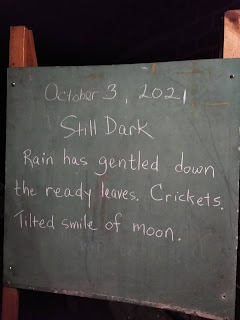Everything is happy in the sunshine this morning, including the praying mantis who lives in our house now, brought in on a patio plant before the first frost. The invisible woman at the top of the stairs is gone, Halloween making way for Thanksgiving and Christmas, starting with this Ho Ho Ho arrangement in her place: an actual present, already wrapped, with the wrapping paper near at hand when needed, for those who are paying attention. (I do expect a query in December: "Where's the Christmas wrapping paper?")
I am happy, too, having scored a DVD version of "A.M. Yoga with Rodney Yee" in the ongoing library book-movie-music sale!* My old, worn out VHS version finally busted in the old, worn out VHS half of the dual DVD/VHS player, breaking it, too. So this morning I resumed "A.M. Yoga" and feel totally at peace. Rodney was as young as ever, still saying, "For seventeen years, I have started each morning..." as I had, with him, for about seventeen years; I have a lot more white hair now, and he has his same, sweet little Buddha of a pot belly on a sleek, relaxed body...but (is it the distortion of my screen or the trauma of the Trump years?), for the first time, I noticed Rodney's tiny hands.
*and also Tony Bennett's Duets!
The green chalkboard is stored in the basement again, now awaiting use as a Welcome board at my daughter's wedding next spring! But here's a pertinent chalkboard poem from the past:
Body talk: “Resuming yoga
is harder than resuming
poems. Reconsider.”
After "A.M. Yoga," I was energized for morning chores--dusting, sweeping, rearranging, taking vegetable matter out to the compost heap in the "re-purposed" old sandbox now covered with eager ivy, stretching into the compost and beyond, starting to climb the volunteer tulip poplar growing too close to the fence. The DVD version of "A.M. Yoga" has new ads for the Gaiam company, all about sustainable living. While I don't have a completely organic/natural lifestyle, I do have a compost heap!
I love how the wrapping paper colors this year go with my stack of books (which also preceded the invisible woman at the top of the stairs) and my pale turquoise (or is that seafoam green?) ribbon and how the blue tulips from a play I directed also fit in. Arranging doodads in my house is another form of "a.m. yoga" for me sometimes, helping me gather the loose ends of my mind like a small bouquet.















































